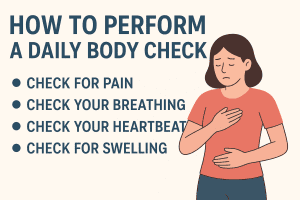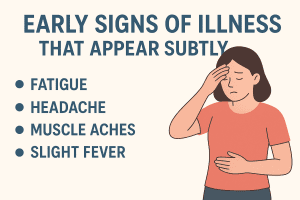In our fast-paced lives, it is easy to ignore the quiet whispers of our body. Most people only pay attention when discomfort grows into pain or illness. However, practicing a daily body check can help us tune in to what our body is trying to say. Just like we monitor the battery percentage of our phone, our body also sends signals every day—some subtle, some loud. Learning to recognize these messages not only helps in maintaining good health but also prevents major issues in the long run.
This article will guide you through the importance of a daily body check, how to understand body warning signs, and the early signs of illness you should never overlook.
Why a Daily Body Check Matters
Your body is like a personal diary—it records everything you eat, how you sleep, your stress levels, and even your emotions. By doing a daily body check, you become more aware of your physical and mental state. Instead of waiting until you feel sick, you start noticing signs your body gives early on.
Think about it: A slight headache could be a result of dehydration, eye strain, or lack of sleep. Ignoring it might lead to migraines or chronic issues. A simple body scan each day helps you ask: Am I tired? Is my stomach bloated? Do I feel tense? These questions may seem small, but they reveal bigger truths about your well-being.
How to Perform a Daily Body Check
Performing a daily body check does not require medical equipment or a doctor’s supervision. It’s a mindful process that takes just 5–10 minutes a day. Here’s a step-by-step approach:
1. Start with Breathing
Take a deep breath and notice how your body feels. Are you breathing shallowly? Do you feel tightness in your chest? Difficulty in breathing can be an early sign of illness like asthma, allergies, or even stress-related issues.
2. Scan from Head to Toe
Gently move your attention from your head down to your feet. Check for:
-
Headaches, dizziness, or pressure behind the eyes
-
Neck or shoulder stiffness
-
Chest heaviness or irregular heartbeat
-
Abdominal bloating, cramps, or nausea
-
Joint pain, swelling, or unusual stiffness
-
Tingling sensations in the hands or feet
3. Observe Your Skin
Your skin is a mirror of internal health. Sudden rashes, acne breakouts, or paleness may indicate nutritional deficiencies, allergies, or hormonal imbalances. Dark circles under the eyes may point to dehydration, poor sleep, or stress.

4. Check Energy Levels
Do you feel fresh when you wake up or always tired? Low energy is one of the most common body warning signs. It may be due to poor sleep, anemia, thyroid problems, or lifestyle imbalance.
5. Digestive Awareness
Pay attention to digestion—bloating, irregular bowel movements, or heartburn are signs your body gives when something is off. Gut health reflects overall health, so never ignore these small indicators.
6. Emotional Signals
Your body doesn’t just reveal physical issues but emotional ones too. Stress may show up as headaches, muscle tension, or stomach issues. Anxiety may cause rapid heartbeat, sweating, or trembling.
By practicing this routine daily, you’ll become more sensitive to changes and spot early signs of illness before they worsen.
Common Body Warning Signs You Shouldn’t Ignore
Sometimes the body screams instead of whispers. These body warning signs should never be ignored:
-
Unexplained weight loss or gain – could indicate thyroid, diabetes, or hormonal imbalance.
-
Frequent fatigue – may point to anemia, poor diet, or chronic illness.
-
Persistent cough or throat irritation – possible allergy, infection, or even respiratory illness.
-
Sudden chest pain or shortness of breath – always treat as a medical emergency.
-
Constant bloating or indigestion – could be a sign of gastrointestinal issues.
-
Numbness or tingling in limbs – may signal nerve issues or poor circulation.
-
Unusual bleeding or bruising – might be linked to blood disorders.
These are the signs your body gives when it needs urgent attention. Instead of brushing them off, take them seriously.
Last 10 Days-
-
Day 61 – Full Body Control Flow | Strength Meets Breath | VfitZone – Ascent Mode Begins
Day 60 – The Warrior Pulse Check | Reassess, Refocus, Recommit | VfitZone
Day 59 – Warrior Coordination Drill | Reflex & Reaction Ritual | VfitZone
Day 58 – Inner Fire Ritual: Metabolic Ignition & Energy Burnout Cleanse | VfitZone
Day 57 – Balance + Mobility Ritual Flow | Absolute Movement Freedom | VfitZone
Day 56 – Breath x Stillness Reset Flow | Nervous System Reboot | VfitZone
Day 55 – Lower Body Strength x Grounded Focus | VfitZone
Day 54 – Core Stability x Control Workout | Build Inner Power | VfitZone
Day 53 – Warrior Restore Ritual: Recharge Your Muscles, Mind & Mission | VfitZone
Day 52 – Strength & Breath Expansion Workout (Level 2) | VfitZone Phase 2
-
Day 51 – Full Body Warrior Workout (Level 1) | Phase 2 Begins | VfitZone
-
Day 50 – The Midpoint Mirror: Track, Trigger, Transform | VfitZone
Early Signs of Illness That Appear Subtly
Illness doesn’t always arrive suddenly. Many diseases give quiet warnings weeks or even months before diagnosis. Recognizing the early signs of illness can make a huge difference in treatment and recovery. Here are some examples:

-
Frequent headaches – not just stress, but could point to vision issues or hypertension.
-
Persistent tiredness – could be anemia, vitamin deficiency, or chronic fatigue syndrome.
-
Mood swings or irritability – sometimes linked to hormonal imbalance or mental health issues.
-
Hair loss or brittle nails – often connected to nutrient deficiency or thyroid problems.
-
Mild fever that keeps coming back – may indicate hidden infections.
-
Digestive troubles after certain foods – signs of food intolerance or allergy.
By being mindful during your daily body check, these subtle warnings can be detected early.
How to Strengthen Your Connection with Body Signals
To truly understand the signs your body gives, you need to build a stronger mind-body connection. Here are a few practices:
-
Keep a Health Journal: Write down symptoms, sleep patterns, energy levels, and diet. Over time, patterns will emerge.
-
Practice Mindful Eating: Notice how your body reacts to certain foods—do you feel energized, bloated, or sluggish?
-
Stay Hydrated: Dehydration can cause headaches, fatigue, and poor focus.
-
Exercise Regularly: Movement improves circulation, energy, and body awareness.
-
Prioritize Sleep: Poor sleep affects every system in the body.
-
Meditation & Breathwork: Helps in calming the nervous system and tuning into subtle body signals.
These practices make your daily body check more accurate and effective.
When to Seek Medical Help
While self-checks are powerful, they are not a replacement for professional diagnosis. If your body warning signs persist or worsen, consult a doctor immediately. A daily body check helps you become proactive, but timely medical guidance ensures you don’t miss critical health issues.
FAQs on Daily Body Check
1. What is a daily body check?
A daily body check is a mindful practice of scanning your body and noticing physical or emotional signals that reflect your health condition.
2. Why is a daily body check important?
It helps in identifying early signs of illness, preventing bigger health problems, and maintaining overall well-being.
3. How long does a daily body check take?
It usually takes 5–10 minutes and can be done anytime, preferably in the morning or before bed.
4. What are common body warning signs?
Persistent fatigue, headaches, unexplained weight changes, digestive issues, and skin changes are some of the most common signals.
5. Can body signals indicate stress or emotions too?
Yes, stress and emotions often show up physically as headaches, muscle tension, stomach problems, or irregular sleep.
6. Should I see a doctor even if I only notice mild symptoms?
Yes, if symptoms are consistent or worsening. A daily body check is meant for awareness, but medical evaluation ensures safety.
Conclusion
Your body is constantly talking to you, whether through energy shifts, physical discomfort, or emotional changes. By practicing a daily body check, you can learn to interpret these messages and prevent health problems before they escalate. Paying attention to body warning signs, recognizing the early signs of illness, and respecting the signs your body gives will empower you to take control of your well-being.
Health is not just about treating sickness—it’s about staying aware and preventing it. Start with a few minutes each day, and you’ll soon discover how powerful this habit can be in creating a healthier, more balanced life.
Comment: “I unlocked my spine 🌀🧘♂️”
Share your posture shift with us on Instagram: @vfitzoneinfo
Watch out Our Journey on You tube- @VFitZoneOfficial
This ritual is part of the VfitZone 365-Day Challenge.
Bookmark it. Practice it. Repeat it.
Need support? Contact us at vfitzoneinfo@gmail.com

Krishnika Saini
SEO Executive And Content Editor At VfitZone
A Digital Marketing Executive who completed her Master’s in Digital Marketing from Delhi Institute of Digital Marketing.
With a background in digital marketing and passion for new opportunities and skills wanting to achieve new heights.

 Day 61 – Full Body Control Flow | Strength Meets Breath | VfitZone – Ascent Mode Begins
Day 61 – Full Body Control Flow | Strength Meets Breath | VfitZone – Ascent Mode Begins Day 60 – The Warrior Pulse Check | Reassess, Refocus, Recommit | VfitZone
Day 60 – The Warrior Pulse Check | Reassess, Refocus, Recommit | VfitZone
 Day 59 – Warrior Coordination Drill | Reflex & Reaction Ritual | VfitZone
Day 59 – Warrior Coordination Drill | Reflex & Reaction Ritual | VfitZone Day 58 – Inner Fire Ritual: Metabolic Ignition & Energy Burnout Cleanse | VfitZone
Day 58 – Inner Fire Ritual: Metabolic Ignition & Energy Burnout Cleanse | VfitZone Day 57 – Balance + Mobility Ritual Flow | Absolute Movement Freedom | VfitZone
Day 57 – Balance + Mobility Ritual Flow | Absolute Movement Freedom | VfitZone Day 56 – Breath x Stillness Reset Flow | Nervous System Reboot | VfitZone
Day 56 – Breath x Stillness Reset Flow | Nervous System Reboot | VfitZone Day 55 – Lower Body Strength x Grounded Focus | VfitZone
Day 55 – Lower Body Strength x Grounded Focus | VfitZone Day 54 – Core Stability x Control Workout | Build Inner Power | VfitZone
Day 54 – Core Stability x Control Workout | Build Inner Power | VfitZone Day 53 – Warrior Restore Ritual: Recharge Your Muscles, Mind & Mission | VfitZone
Day 53 – Warrior Restore Ritual: Recharge Your Muscles, Mind & Mission | VfitZone Day 52 – Strength & Breath Expansion Workout (Level 2) | VfitZone Phase 2
Day 52 – Strength & Breath Expansion Workout (Level 2) | VfitZone Phase 2 Day 51 – Full Body Warrior Workout (Level 1) | Phase 2 Begins | VfitZone
Day 51 – Full Body Warrior Workout (Level 1) | Phase 2 Begins | VfitZone